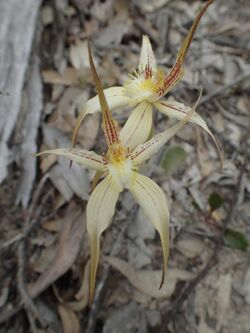Biology:Caladenia × triangularis
| Shy spider orchid | |
|---|---|

| |
| Caladenia × triangularis growing in Wandoo National Park | |
| Scientific classification | |
| Kingdom: | Plantae |
| Clade: | Tracheophytes |
| Clade: | Angiosperms |
| Clade: | Monocots |
| Order: | Asparagales |
| Family: | Orchidaceae |
| Subfamily: | Orchidoideae |
| Tribe: | Diurideae |
| Genus: | Caladenia |
| Species: | C. × triangularis
|
| Binomial name | |
| Caladenia × triangularis R.S.Rogers[1]
| |
Caladenia × triangularis, commonly known as the shy spider orchid, is a plant in the orchid family Orchidaceae and is endemic to the south-west of Western Australia. It has a single hairy leaf and up to three pale yellow flowers. A natural hybrid between flava and C. longicauda, it is a rare species found between Perth and Esperance.
Description
Caladenia × triangularis is a terrestrial, perennial, deciduous, herb with an underground tuber and a single hairy leaf, 50–100 mm (2–4 in) long and 5–10 mm (0.2–0.4 in) wide. Up to three pale yellow flowers 50–70 mm (2–3 in) wide are borne on a spike 100–250 mm (4–10 in) tall. The petals and lateral sepals spread widely apart and the labellum is relatively small with a short fringe and four or more rows of calli along its mid-line. Flowering occurs from August to October.[2]
Taxonomy and naming
Caladeni × triangularis was first formally described 1827 by Richard Sanders Rogers from a specimen collected between Wagin and Narrogin. The description was published in Transactions and Proceedings of the Royal Society of South Australia.[3][4] The epithet (triangularis) refers to the shape of the labellum of this orchid.[2]
Distribution and habitat
The shy spider orchid grows in woodland and shrubland between Perth and Esperance in the Avon Wheatbelt and Jarrah Forest biogeographic regions.[2][5]
Conservation
Caladenia × triangularis is classified as "Priority Four" by the Government of Western Australia Department of Parks and Wildlife,[5] meaning that is rare or near threatened.[6]
References
- ↑ "Caladenia x triangularis". World Checklist of Selected Plant Families (WCSP). Royal Botanic Gardens, Kew. http://wcsp.science.kew.org/namedetail.do?name_id=28730.
- ↑ 2.0 2.1 2.2 Brown, Andrew; Dundas, Pat; Dixon, Kingsley; Hopper, Stephen (2008). Orchids of Western Australia. Crawley, Western Australia: University of Western Australia Press. p. 461. ISBN 9780980296457.
- ↑ "Caladenia x triangularis". APNI. https://id.biodiversity.org.au/instance/apni/574705. Retrieved 16 October 2018.
- ↑ Rogers, Richard S. (1927). "Contributions to the Orchidaceous flora of Australia". Transactions and Proceedings of the Royal Society of South Australia 51: 10–11. https://www.biodiversitylibrary.org/item/129843#page/14/mode/1up. Retrieved 18 October 2018.
- ↑ 5.0 5.1 "Caladenia x triangularis". FloraBase. Western Australian Government Department of Parks and Wildlife. https://florabase.dpaw.wa.gov.au/browse/profile/1618.
- ↑ "Conservation codes for Western Australian Flora and Fauna". Government of Western Australia Department of Parks and Wildlife. https://www.dpaw.wa.gov.au/images/documents/plants-animals/threatened-species/Listings/Conservation%20code%20definitions.pdf. Retrieved 18 October 2018.
Wikidata ☰ Q15439666 entry
 |

